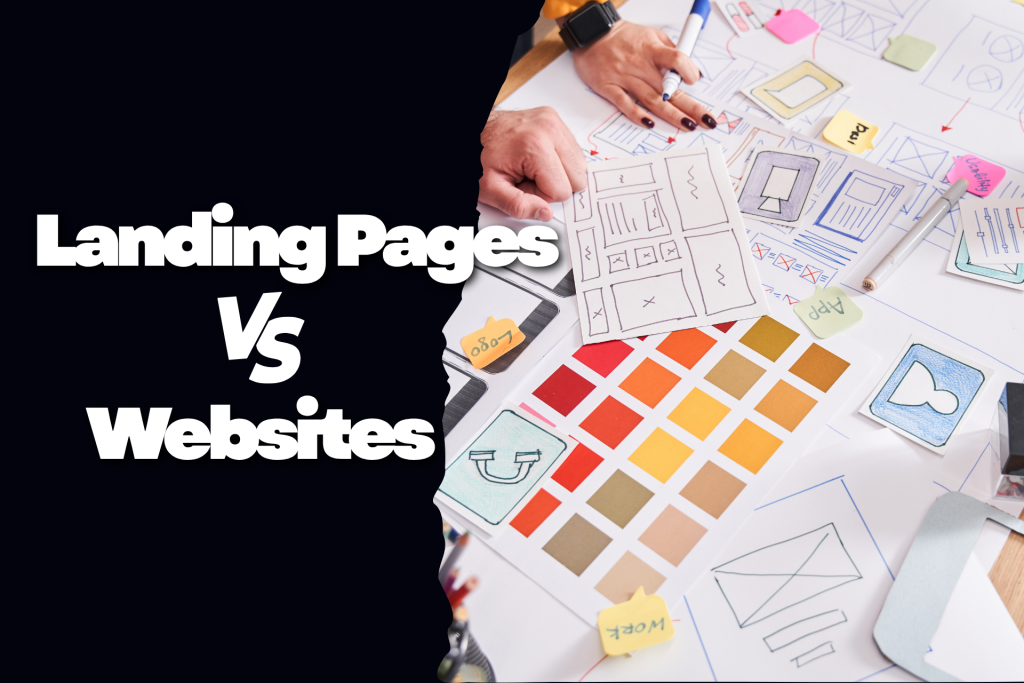An online presence is essential for any business. However, one of the most common questions business owners face is whether they need a website or a landing page to achieve their goals. While both serve as online destinations for your audience, they perform very different roles within your marketing strategy.
Understanding the distinction between a website and a landing page helps you make informed decisions about where to invest your resources. A well-planned online platform can boost brand awareness, generate leads, and increase conversions, whereas the wrong approach can limit your reach and effectiveness.
This article explores the key differences, benefits, and best uses for each option, helping you determine which one best suits your business objectives.
Table of Contents
Understanding Websites
A website is a comprehensive online platform that represents your entire business. It contains multiple interconnected pages that provide detailed information about your products, services, team, and brand values. A website serves as the central hub for all your digital marketing activities, allowing visitors to explore, learn, and engage at their own pace.
Websites are designed for long-term use and cater to different stages of the customer journey. They are ideal for businesses looking to build credibility, improve brand recognition, and maintain consistent communication with their audience. A good website provides easy navigation, high-quality content, and clear calls-to-action that guide visitors toward taking the next step.
In addition, websites support search engine optimization (SEO), allowing your business to appear in search results and attract organic traffic over time. This makes them a valuable asset for any business seeking sustainable online growth.
Understanding Landing Pages
A landing page is a single, focused web page designed with one clear objective in mind, such as capturing leads, promoting a specific offer, or encouraging users to take a single action. Unlike websites that contain multiple sections, a landing page keeps the visitor’s attention centered on a specific message or goal.
Landing pages are often used in digital advertising, email marketing, or social media campaigns to direct users toward a specific conversion. Because they are so focused, landing pages tend to have minimal navigation and content, helping visitors stay on track and take the desired action without distraction.
The main strength of a landing page lies in its simplicity and purpose-driven design. Every element on the page, from the headline to the call-to-action, is strategically placed to achieve one outcome, such as sign-ups, purchases, or inquiries.
Key Differences Between Landing Pages and Websites
Although websites and landing pages may look similar on the surface, their purpose and structure are very different. The following areas highlight the main distinctions between the two:
Purpose:
A website provides a broad overview of your business, while a landing page focuses on one specific goal or campaign.
Structure:
Websites consist of multiple pages, such as Home, About, Services, and Contact. Landing pages usually contain a single page without external navigation.
Audience Journey:
Websites allow users to browse and learn more about your brand at their own pace. Landing pages guide visitors toward one particular action, limiting distractions.
Longevity:
Websites are long-term digital assets that evolve with your business. Landing pages are typically short-term and used for specific marketing campaigns.
Searchability:
Websites are built for SEO and can attract organic traffic from search engines. Landing pages are often used in paid campaigns and are not designed for ongoing search visibility.
Understanding these differences helps clarify that websites and landing pages are not competitors but complementary tools with distinct roles in your digital strategy.
When a Business Should Use a Website
A full website is essential for businesses that aim to establish a strong digital foundation and provide comprehensive information to their customers. You should consider a website if your goals include:
- Building brand credibility and trust
- Displaying multiple products or services
- Improving visibility through search engines
- Offering detailed company information
- Providing resources such as blogs, FAQs, or case studies
A website is also beneficial for businesses that rely on long-term relationships with customers. It allows you to showcase your expertise, maintain communication, and provide ongoing value through regular content updates.
Moreover, websites help create consistency across marketing channels. Whether someone finds your business through search, social media, or advertising, your website acts as a reliable destination that reinforces your identity and builds recognition over time.
When a Business Should Use a Landing Page
A landing page is ideal when your objective is specific and measurable. It is most useful for campaigns that target a single offer or audience segment. Businesses typically use landing pages when:
- Running paid advertising campaigns
- Launching new products or services
- Promoting limited-time offers
- Collecting leads through forms or sign-ups
- Driving registrations for events or webinars
Landing pages are focused on conversion, meaning they are designed to achieve immediate results. Because there are fewer distractions and a clear call-to-action, they tend to have higher conversion rates than general website pages.
A well-designed landing page can complement your broader marketing efforts by turning interested visitors into qualified leads or paying customers. It’s a powerful tool when used strategically and integrated into a wider campaign.
How to Decide Which Option Fits Your Goals
The choice between a website and a landing page depends entirely on your business goals, target audience, and marketing strategy. If your goal is to establish a strong online presence, provide detailed information, and build long-term credibility, then a website is the better investment. It will serve as your main digital hub and support all other marketing channels. If your goal is to drive specific actions such as sign-ups, sales, or inquiries within a limited timeframe, a landing page is more appropriate. It allows you to measure results quickly and optimise performance based on data.
However, the decision is not always about choosing one over the other. Many successful businesses use both. A website provides the foundation for your brand, while landing pages serve as targeted tools to capture leads or promote campaigns. The most effective approach is to align your choice with your marketing funnel. Use your website to attract and educate visitors, and use landing pages to convert them into customers.
Integrating Both for Maximum Results
In a strong digital strategy, websites and landing pages work together. The website builds authority and trust, while landing pages drive action and measure effectiveness. For instance, your website can direct visitors to specific landing pages through calls-to-action or promotional banners. In turn, landing pages can lead users back to your website for further engagement, such as exploring other services or subscribing to newsletters.
Integrating both ensures that your marketing efforts are cohesive and that every stage of the customer journey is addressed. The website attracts and informs, while the landing page converts and delivers measurable outcomes. This combination allows businesses to balance long-term branding with short-term performance goals, creating a more complete and effective online strategy.
Conclusion
Choosing between a website and a landing page is not about which is better, but rather which best serves your current business objectives. A website gives your brand credibility, builds relationships, and supports long-term growth. A landing page focuses on immediate results, driving conversions through targeted campaigns. For most businesses, the ideal approach is to have both. The website serves as your permanent digital home, while landing pages act as specialized tools that support individual marketing goals.
By understanding how each functions and when to use them, you can make informed decisions that strengthen your digital presence and improve performance. Whether you are launching a new campaign or building your online foundation, choosing the right structure can help you connect effectively with your audience and achieve lasting results.



